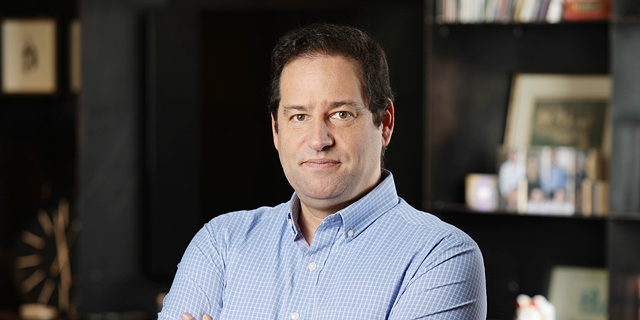
2022 VC Survey
TLV Partners: “Startups, it’s time to go on the offense!”
Managing Partner Shahar Tzafrir joined CTech to offer advice to companies preparing for next year
“As potentially ruthless as it may sound, every organization beyond a certain size has inefficient layers – removing them not only increases runway, it makes the company more efficient, and often the remaining employees acknowledge the waste previously surrounding them,” explained TLV Partners Managing Partner, Shahar Tzafrir, when asked about how companies should prepare for the year ahead.
It’s no secret that companies have had a tough time in the last few months, and sometimes harsh decisions need to be made by management to stay afloat.
Read every interview in our ongoing project
“On the other hand – for some startups, it’s time to go on the offense! Aim to buy competitors or add-on companies traded below the actual value,” he added. “Land grab territories where competitors, shell-shocked, have stopped fighting. Each company has its unique strategy that goes from defense to offense, but under all scenarios under responsible pre-meditated cash runway management.”
Name of fund/funds: TLV Partners
Total sum of fund: $820 million
Managing Partners: Rona Segev, Adi Yarel, Eitan Bek, Shahar Tzafrir
Notable/select portfolio companies: Next Insurance, Aqua Security, Unit, Mesh Payments, SilverFort, Aidoc, Firebolt, Immunai, Granulate (acquired by Intel). Overall we have invested in more than 50 startups at the Seed and Round A stages.
Tzafrir took part in CTech’s series “2022 VC Survey” to share some insights on what companies can expect to see in 2023 and beyond.
If 2020 was the year of the pandemic, and 2021 was the year of records, how would you define 2022 in the VC sector?
The first half of the year continued what, in hindsight (and for some in foresight) were financing rounds that were super-fast, of high and mostly unrealistic valuation investments, with large sums of money invested. The burst of the public market, fueled by zero interest-ending, inflation, and other macroeconomic elements, very quickly demonstrated that later-stage startup valuations had, in most cases, zero connection to reality. That created a chain reaction in investments at different stages of VC investments, from growth rounds and below. Mostly leading to a complete halt in investments. In turn, causing concerns both for founders and investors about the viability of future financing rounds, their valuations, and their likelihood of happening.
Who are the big winners of 2022 and why?
VCs who waited were disciplined and did not invest at insanely high valuations. Startups who raised enough capital before the bubble burst, however, at reasonable valuations that will not harm them when it’s time for their next funding round. Startups who understood what a valid business model is and what good sales growth means. I.e., not losing money on every sales transaction (after offsetting the rest of the organizational expenses). And that this is what matters, not a bragging paper interview, a flattering headline, or an ever-increasing number of hired employees.
Who are the big losers of 2022 and why?
The opposite of the previous answer. Companies still looking for who they are, how they sell their products, and how each transaction can be profitable on its own - yet raised a lot of money at a very high valuation - are in trouble. But at least they have time, e.g., cash runway, to try and fix it (that will be very hard). Funds who over-invested at inflated valuations - it’s sadly likely that their returns for the last two years' vintages will be negative overall on average.
What do you expect in the VC sector in 2023?
2023 should be an excellent year for VCs who have always focused and specialized in seed-stage investments. More early-stage startups will continue to emerge and will likely be with even stronger founders. When times are hard, only stronger founders with an urge that they can’t control jump in the water and launch new startups. It will be very hard for companies who raised too much capital earlier, did not use it effectively, and will need to raise money during 2023 and possibly 2024. Some will fail to raise funds at all and shut down. Some will meet the unfortunate reality of down-rounds or, worse, to survive. Few new ‘emerging’ funds, if any, will enter the scene. Many micro funds will find it hard, or impossible, to raise their next micro fund. Many existing funds will delay raising their next venture capital fund as much as possible, with their LPs in a not-so-subtle way asking them not to invest or at the least to slow their pace of investments. Possibly the ‘on paper’ performance will suffer due to down rounds, further decreasing their chances of raising their next VC fund. On the other hand, the top quartile funds will, if they need to, be able to raise their next venture capital vintage fund as they previously could.
What global processes will affect (positively and negatively) the Israeli market?
Growing interest rates will make venture capital as an asset class potentially slightly less attractive for existing LPs who allocate funds for VCs. On the other hand, top-quartile VC funds whose results are compared to the public market indexes will demonstrate even more than before how strong their returns are compared to traditional, less risky alternatives.
How should different companies prepare for the coming year?
Spend only what’s required. Hire – which has always been true – employees only when you must, not when you can – keeps you lean and efficient, able to react nimbly and quickly to changes. Carefully evaluate how ‘lean’ the organization is and should be. As potentially ruthless as it may sound, every organization beyond a certain size has inefficient layers – removing them not only increases runway, it makes the company more efficient, and often the remaining employees acknowledge the waste previously surrounding them. Sales should focus on a model that would make them profitable on a per-deal basis, i.e., not lose net cash on every dollar earned. In some cases and beyond certain growth, it forces the organization to aim for profitability. If previously a lot of strategies went into entering new markets, even more so is required now.
On the other hand – for some startups, it’s time to go on the offense! Aim to buy competitors or add-on companies traded below the actual value. Land grab territories where competitors, shell-shocked, have stopped fighting. Each company has its unique strategy that goes from defense to offense, but under all scenarios under responsible pre-meditated cash runway management.
What will be of the dozens of unicorns born last year?
Enough cash raised increases the time available to make changes, but fixing it even with more capital is super hard if the DNA is ruined. However, as in any crisis, some will emerge even more successful, acquiring competitors and growing their market share. Offense vs. Defense, a lot depends not only on the amount of cash raised but on sales growth with a viable business model that the company already had – or did not yet have. And as always - cliche but true - it’s about execution.
HR: Do the layoffs, those that have already happened and those that are coming, help to fix in any way the distress experienced by companies over the past 2-3 years?
If the company had rotten DNA – i.e., super growth in headcount and sales and market efforts while losing money on any new customer they win – layoffs would only extend the runway, but fixing this wrong DNA will remain so hard to fix in time. I believe salaries in high tech, even before the ‘we will pay you whatever you want to join,’ were high and will remain so due to the scarcity of great talent. Some of the adjacent positions will, very regrettably, be significantly hurt.
Additional comments:
The hitchhiker's guide to the galaxy summarized it best - “don’t panic.” But evaluate strategically where you are and where you need to get to in the highest degree of objectivity possible.
Neosec, Noble, Port - TLV Partners’ notable portfolio companies
Neosec
Cybersecurity: Neosec provides a SaaS platform that unifies security and development teams to protect modern applications from threats.
Founders: Co-Founder & CEO, Giora Engel; Co-Founder & CTO, Ziv Sivan
Founding year: 2021
Number of employees: 50+ employees
Explanation behind investment:
There is a tidal wave of products being served via APIs. These APIs are becoming more complex and critical to company operations. Therefore, a security product that protects APIs from abuse and misuse is crucial.
Noble
Fintech: Noble empowers any company to quickly build, launch, and scale credit products, by providing a complete infrastructure to assess their business customers' creditworthiness.
Founders: Co-Founder & CEO, Tomer Biger; Co-Founder & CTO, Moran Mishan
Founding year: 2021
Number of employees: 20+ employees
Explanation behind investment:
More and more companies are looking to incorporate financial services into their offering, and specifically when it comes to offering credit-based products, the infrastructure to enable non-finance savvy companies to do this seamlessly simply doesn’t exist. Noble fills this gap.
Port
SaaS: Port combined hundreds of years of DevOps knowledge with thousands of hours of research to transform the developer experience as the world sees it today. Starting by building the Developer Portal that brings everyone together, and going forward as the developer experience forefront.
Founders: Co-Founder & CEO, Zohar Eini; Co-Founder & CTO, Yonatan Boguslavski
Founding year: 2022
Number of employees: 20+ employees
Explanation behind investment:
DevOps promised agility, but most implementations of DevOps caused just more complexity. Port centralizes DevOps practices and automation into one platform that brings back order and efficiency to the DevOps team.
We’ve also made five new Seed investments in the second half of 2022. As all of them are in a stealth stage, we can not disclose any information about them yet.
